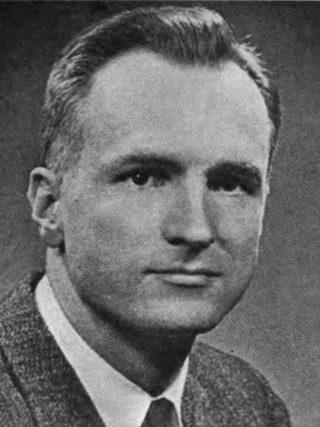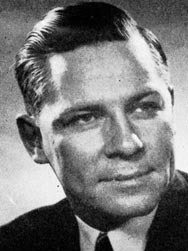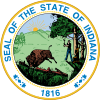
Unigov is the colloquial name adopted by the city of Indianapolis, Indiana, to describe its consolidated city–county government. By an act of the Indiana General Assembly, Indianapolis consolidated with the government of Marion County in 1970.

Thomas Taggart was an Irish-American politician who was the political boss of the Democratic Party in Indiana for the first quarter of the twentieth century and remained an influential political figure in local, state, and national politics until his death. Taggart was elected auditor of Marion County, Indiana (1886–1894), and mayor of Indianapolis. His mayoral administration supported public improvements, most notably the formation of the city's park and boulevard system. He also served as a member of the Democratic National Committee (1900–1916) and as its chairman (1904–1908). Taggart was appointed to the U.S. Senate in March 1916, but lost the seat in the November election.

Alex M. Clark was an American politician. He became the youngest mayor of Indianapolis in 1951. He served one term and later ran again in 1967, losing in the primary to eventual winner Richard Lugar. He was a World War II veteran, and a former POW. In 1956 he and a number of friends formed the Wyoming Antelope Hunters Club in Indianapolis, which is still an active social club today. Prior to being mayor, Clark was a deputy prosecutor and judge in Marion County, Indiana.
John J. Barton was an American politician who served one term as mayor of Indianapolis. During his time in office, plans were made for the construction of the Indiana Convention Center. He was defeated for re-election by Indianapolis Board of School Commissioners member and future United States Senator Richard Lugar in 1967.
Caleb Stone Denny was an American politician who served as the 15th and 17th mayor of the city of Indianapolis, Indiana. Denny first worked as a teacher and librarian before completing a law degree. He served as the assistant attorney general of Indiana from 1873 to 1875. In 1885, Denny resigned his position of city attorney to try to obtain the Republican nomination for mayor of Indianapolis. He ran successfully against incumbent mayor John L. McMaster and won the subsequent election by only 60 votes. Denny was reelected in 1887. He chose not to run in 1889 and Democrat Thomas L. Sullivan was elected as mayor. In 1892, Denny returned to politics and defeated Sullivan. He served a single term.
John W. Holtzman was the 20th mayor of the city of Indianapolis, Indiana. Holtzman first came to Indianapolis in 1883 to read law. He was admitted to the bar in 1885. Holtzman, a Democrat, first ran for mayor in 1903 when he defeated Republican incumbent Charles A. Bookwalter. During the 1905 campaign, the two political rivals met again but Bookwalter prevailed and obtained a second term.
Harrison Horton Dodd was a founder of the 1860s-era OSL, a paramilitary secret society which was a continuation and/or extension of the KGC. The basic goal of members of the OSL was to thwart the war efforts of the Union military forces, while remaining citizens of the United States.
Charles Webster Jewett was an Indiana lawyer and Republican politician. Jewett, who studied law at Harvard University, was chosen as chairman of the Marion County Republican Committee in 1914. He was the mayor of Indianapolis from 1918 to 1921. In the 1917 Republican primary election for the mayoral candidacy, Jewett had defeated Samuel L. Shank who eventually succeeded him as mayor. In 1938, Jewett ran for a seat in the United States House of Representatives and lost to the incumbent Louis Ludlow.

The 2012 United States Senate election in Indiana took place on November 6, 2012, concurrently with the U.S. presidential election as well as other elections to the United States Senate and House of Representatives, and various state and local elections.

The Indianapolis mayoral election of 1971 took place on November 2, 1971. This was the first election after the creation of the Unigov. Incumbent Republican Richard Lugar was reelected to a second term. Lugar's challenger had been Democrat John Neff, a former state senator. Neff had campaigned in opposition to the Unigov, promising to seek its abolishment if elected.

The Indianapolis mayoral election of 1975 took place on November 4, 1975 and saw the election of Republican William H. Hudnut III.

The Indianapolis mayoral election of 1991 took place on November 5, 1991 and saw the election of Republican Stephen Goldsmith.

The Indianapolis mayoral election of 1979 took place on November 6, 1979 and saw the reelection of Republican William H. Hudnut III.

The Indianapolis mayoral election of 1987 took place on November 3, 1987, and saw the reelection of Republican William H. Hudnut III to a fourth term.
The Indianapolis mayoral election of 1963 took place on November 5, 1963 and saw the election of John J. Barton.
The Indianapolis mayoral election of 1959 took place on November 3, 1959 and saw the reelection of Charles H. Boswell, who had become mayor eleven months earlier, after Philip L. Bayt resigned to become Marion County Prosecutor. Boswell defeated Republican William T. Sharp.
The Indianapolis mayoral election of 1955 took place on November 8, 1955 and saw the election of Philip L. Bayt to a second non-consecutive term. Bayt's opponent was Republican James O. Birr.

The Indianapolis mayoral election of 1951 took place on November 6, 1951 and saw the election of Republican municipal court judge Alex M. Clark as mayor, defeating Democratic incumbent Philip L. Bayt. Clark became one of the youngest mayors in Indianapolis' history.
The 1925 Indianapolis mayoral election was held on November 3, 1925 and saw the election of Republican former Marion County treasurer John L. Duvall, who defeated Democratic former Indianapolis city attorney Walter Meyers.
Paul Francis Cantwell was an American politician, active in Indianapolis, who served as a Democratic member of the Indiana House of Representatives.











